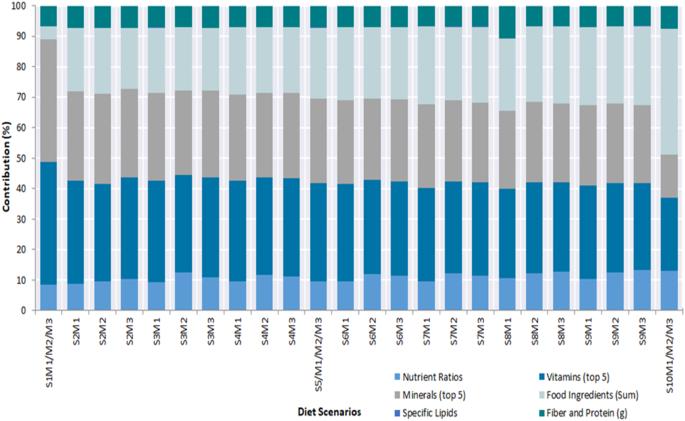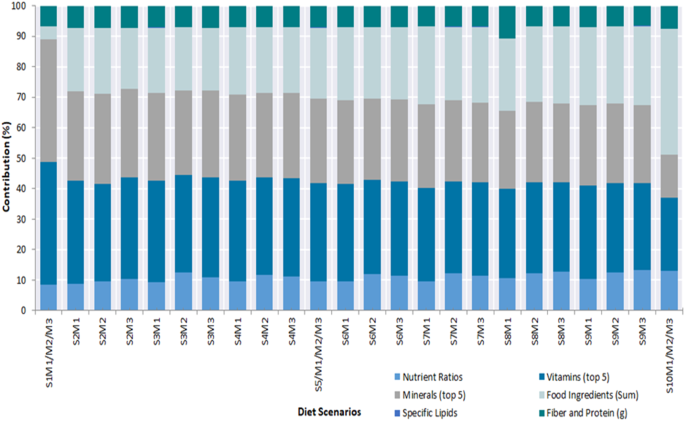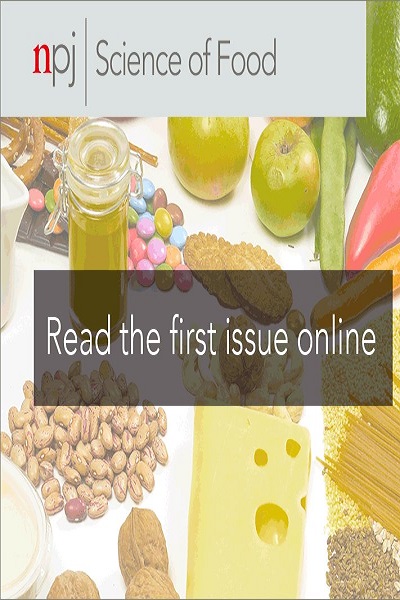Sustainable healthy diet modeling for a plant-based dietary transitioning in the United States
IF 6.3
1区 农林科学
Q1 FOOD SCIENCE & TECHNOLOGY
引用次数: 0
Abstract
The potential environmental and nutritional benefits of plant-based dietary shifts require thorough investigation to outline suitable routes to achieve these benefits. Whereas dietary consumption is usually in composite forms, sustainable healthy diet assessments have not adequately addressed composite diets. In this study, we build on available data in the Food4HealthyLife calculator to develop 3 dietary concepts (M) containing 24 model composite diet scenarios (S) assessed for their environmental and nutritional performances. The Health Nutritional Index (HENI) and Food Compass scoring systems were used for nutritional quality profiling and estimates of environmental impact were derived from previously reported midpoint impact values for foods listed in the What We Eat in America database. The diets were ranked using the Kruskal‒Wallis nonparametric test, and a dual-scale data chart was employed for a trade-off analysis to identify the optimal composite diet scenario. The results showcased a distinct variation in ranks for each scenario on the environment and nutrition scales, describing an inherent nonlinear relationship between environmental and nutritional performances. However, trade-off analysis revealed a diet with 10% legumes, 0.11% red meat, 0.28% processed meat and 2.81% white meat could reduce global warming by 54.72% while yielding a diet quality of 74.13 on the Food Compass Scoring system. These observations provide an interesting forecast of the benefits of transitioning to an optimal plant- and animal-based dieting pattern, which advances global nutritional needs and environmental stewardship among consumers.


美国植物性饮食转型的可持续健康饮食模型。
以植物为基础的饮食转变的潜在环境和营养效益需要进行彻底的调查,以概述实现这些效益的合适途径。鉴于膳食消费通常是复合形式,可持续健康饮食评估尚未充分解决复合饮食问题。在本研究中,我们以Food4HealthyLife计算器中的现有数据为基础,开发了3种膳食概念(M),其中包含24种模型复合饮食方案(S),并对其环境和营养性能进行了评估。健康营养指数(HENI)和食物指南针评分系统用于营养质量分析,环境影响估计来自先前报告的中点影响值,这些中点影响值列在“我们在美国吃什么”数据库中。采用Kruskal-Wallis非参数检验对饲粮进行排序,并采用双尺度数据图进行权衡分析,以确定最佳的复合饲粮方案。结果显示,在环境和营养尺度上,每个场景的排名都有明显的变化,描述了环境和营养性能之间固有的非线性关系。然而,权衡分析显示,10%豆类,0.11%红肉,0.28%加工肉和2.81%白肉的饮食可以减少54.72%的全球变暖,而饮食质量在食物指南针评分系统中为74.13。这些观察结果提供了一个有趣的预测,即过渡到以植物和动物为基础的最佳饮食模式的好处,这将促进消费者的全球营养需求和环境管理。
本文章由计算机程序翻译,如有差异,请以英文原文为准。
求助全文
约1分钟内获得全文
求助全文
来源期刊

NPJ Science of Food
FOOD SCIENCE & TECHNOLOGY-
CiteScore
7.50
自引率
1.60%
发文量
53
期刊介绍:
npj Science of Food is an online-only and open access journal publishes high-quality, high-impact papers related to food safety, security, integrated production, processing and packaging, the changes and interactions of food components, and the influence on health and wellness properties of food. The journal will support fundamental studies that advance the science of food beyond the classic focus on processing, thereby addressing basic inquiries around food from the public and industry. It will also support research that might result in innovation of technologies and products that are public-friendly while promoting the United Nations sustainable development goals.
 求助内容:
求助内容: 应助结果提醒方式:
应助结果提醒方式:


